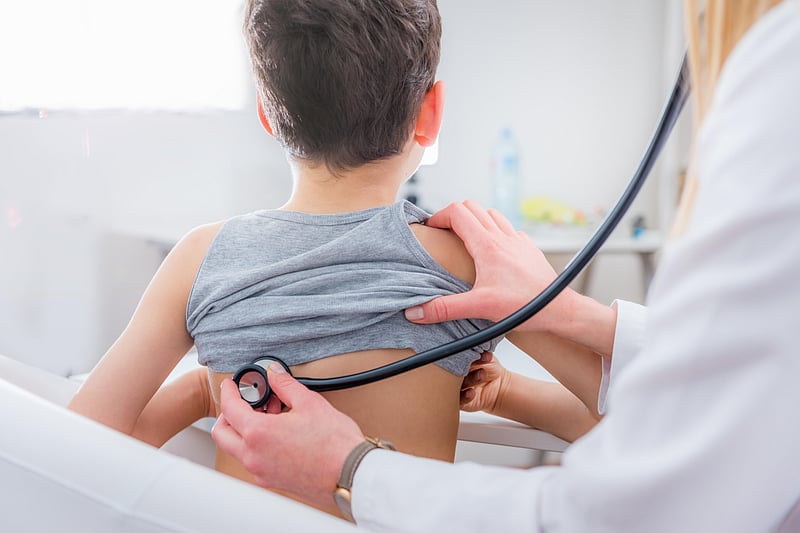Get Healthy!

- Amy Norton
- Posted August 29, 2022
Leading U.S. Pediatricians' Group Issues Guidelines to Prevent Patient Abuse
Recent years have seen several high-profile cases of doctors sexually abusing young patients. Now the American Academy of Pediatrics (AAP) is issuing new recommendations aimed at prevention.
Medical visits are usually a safe place for children and teenagers, but when abuse does happen, it is an egregious violation.
One reason, the AAP says, is because parents and kids trust that health care providers are looking out for their welfare.
Experts who were not involved in the recommendations pointed to another central issue: the imbalance of power and knowledge. In a medical setting, young patients and parents may not even know when abuse has occurred.
"This is not a high-risk setting, but it is a complicated setting," said David Finkelhor, director of the Crimes Against Children Research Center at the University of New Hampshire. "Health care providers have tremendous authority. They're expected to do physical exams, they're expected to do things that other people cannot."
Perhaps the most infamous cases is that of Larry Nassar, a former team physician for USA Gymnastics who was accused of assaulting at least 265 girls under his care between 1992 and 2014. Many victims were sexually abused at every visit, under the guise of medical care -- often with their parents in the room.
"The health care provider is someone you trust, and in the moment, you're so vulnerable," said Melissa Merrick, president and CEO of the nonprofit Prevent Child Abuse America.
When a violation occurs, she added, the victim may only realize it at some point later on.
Merrick said she was glad to see the AAP issuing its recommendations.
"Child abuse prevention is an adult responsibility," she said. "It's everybody's business -- everybody who comes into the life of a child."
As a basic step, the AAP says medical facilities should do background checks on all staff and volunteers who will have contact with children, looking for any past allegations of abuse. That, however, is not adequate on its own, the group adds, since less than 1% of people who molest children have a criminal record.
The recommendations also advise having explicit policies around "sensitive" exams (involving the genital area or breasts), as well as training on staff-patient boundaries and how to report possible abuse by colleagues. That's in part because those policies send a message to potential perpetrators that patient abuse will not be tolerated, the AAP says.
"Chaperones" are one specific safeguard. Any time a doctor is performing a sensitive exam, another medical professional, such as a nurse, should be present, the AAP says. Parents are not considered adequate chaperones, because they do not know whether proper procedures are being followed.
Finkelhor said chaperones are helpful, though "not foolproof." He encouraged parents and kids to speak up and ask questions if they are ever uncomfortable with something a health care provider is doing.
Ideally, doctors should be proactive in that regard. The AAP stresses that they should explain why a sensitive exam is being done, as well as each step in the exam.
That's a critical recommendation, Merrick said. But whether it happens in real life -- or whether patients and parents feel a doctor's explanation was clear -- is a different matter.
Merrick agreed that in those cases, parents and kids should trust their instincts and speak up if they have questions.
Child sexual abuse is, unfortunately, common: Studies estimate that in the United States, up to 25% of girls and 10% of boys have been victimized. There are no good statistics on the prevalence of child sexual abuse in health care, specifically, according to the AAP.
Finkelhor pointed to what he thinks is likely a much more common problem: poorly done sensitive exams. That is, exams where a doctor has no intention of abuse, but does not explain or conduct the procedure properly.
"There are certainly children who have been harmed by an incompetently done sensitive exam," Finkelhor said.
Among its recommendations, the AAP says pediatricians need specific training in how to conduct those exams. That same standard should go for any doctor who treats children, Finkelhor said, noting that many kids see family physicians or other primary care doctors.
Merrick agreed that such training is key.
"Health care providers should recognize that this is probably an uncomfortable experience for a child," she said. "It needs to be done properly and sensitively."
The recommendations were published online Aug. 29 in the AAP journal Pediatrics.
More information
The nonprofit group RAINN has more on protecting kids from sexual abuse.
SOURCES: David Finkelhor, PhD, professor, sociology, and director, Crimes against Children Research Center, University of New Hampshire, Durham; Melissa Merrick, PhD, president and CEO, Prevent Child Abuse America, Chicago; Pediatrics, Aug. 29, 2022, online





